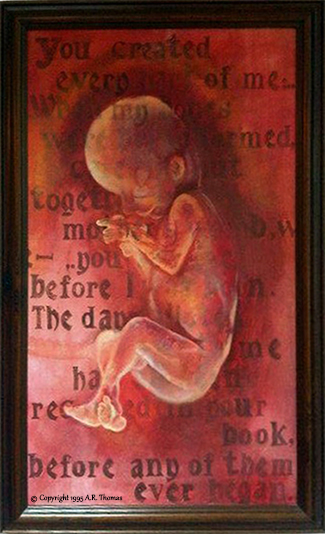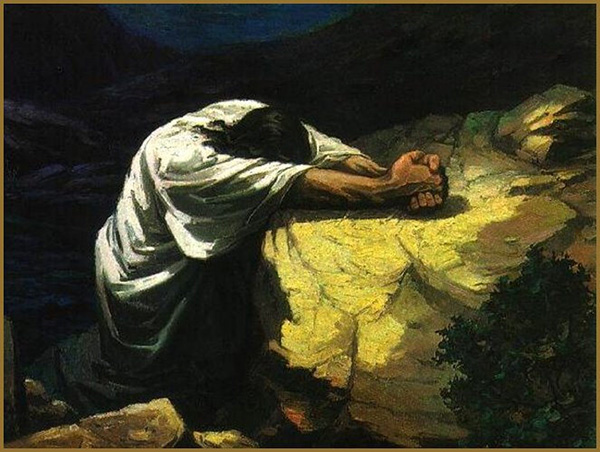“Before I formed you in the womb I knew you, and before you were born I consecrated you; I appointed you a prophet to the nations.” (Jeremiah 1:5)
What does it mean that God knew Jeremiah before even one of his cells were formed?
And did He know you in the same way? If so, how does that affect your life on earth today?
We’ll begin to unpack those answers here.
God Knows You
The Hebrew word for know is yada (יָדַע).
As in English, yada has a wide range of meanings from knowing someone intimately to knowing about them; from knowing how to do something to perceiving, learning, and experiencing something.
Yada appears 947 times in the Hebrew Scriptures, but we’ll focus here on what God knows about us and what it could mean that He even knew us before He knit us in our womb.
In Scripture, we see that God has intimate knowledge of us at the depth of our character and soul:
- He knows the hearts of all men (1 Kings 8:39; 2 Chronicles 6:30), those who are His servants (2 Samuel 7:20; Nahum 1:7; 1 Chronicles 17:18) and those who are false, vain, and deceitful (Job 11:11).
- He keeps the lowly close to His thoughts, but only knows the haughty from afar (Psalm 138:6).
- He knows our words before they are spoken (Psalm 139:4) and the distresses of our lives (Psalm 31:7).
And He knows you, “Even the hairs of your head are all numbered.” (Matthew 10:30)

“When I look at your heavens, the work of your fingers, the moon and the stars, which you have set in place, what is man that you are mindful of him, and the son of man that you care for him? … O Yehova, our Lord, how majestic is your name in all the earth!” (Psalm 8:3–9)
There is nothing that we can say, think, or do that God doesn’t know!
“Can a man hide himself in hiding places So I do not see him?” declares the LORD. “Do I not fill the heavens and the earth?” declares the LORD. (Jeremiah 23:24)
And as David sings in Psalm 139:7: “Where can I flee from your presence?”
But God also knows things before we do them.
The “Song of Moses,” as it is called, describes how His Chosen People would behave once they entered their Promised Land (Deuteronomy 32).
And we are told that God knew Abraham, Jeremiah, David, and Messiah Yeshua before the first cell of their embryos formed (Genesis 18:19; Jeremiah 1:5; Psalm 139:16; Isaiah 7:14, 9:6).
Let’s now look at what that could mean.

Caleb, an original painting by A. R. Thomas on display
at a charity based in Jerusalem. (Photo by A.R. Thomas)
When Did God First Know You?
The Greek Philosopher Plato (c. 424–347 BC) was not only a foundational figure in Western science, politics, and philosophy, He is also considered a founder of Western religion and spirituality.
In Plato’s “Theory of Forms” and in his book Phaedo, he popularized the idea that we know what is beautiful and what is justice without even experiencing it because our souls knew it before we were born.
Plato’s theory about this pre-existent soul helped the Greek world better explain their own ideas about reincarnation, a standard belief throughout Greek life.
Soon after Plato’s death (in the early 4th century BC), the Greeks conquered the nation of Israel and the Jewish People became “Hellenized,” incorporating Greek thought, practices, and culture into their own.

Plato (left) converses with Aristotle (right) and gestures to the heavens, representing Plato’s belief in his “Theory of Forms.” This image is a portion of a larger detail of the School of Athens (1509), by Rafael.
Though the pre-existence of souls was not found in the Hebrew Scriptures, we see it appear in gnostic writings, apocryphal books, and in Jewish literature from at least the 4th century BC. And it has continued until today.
For instance, a Jewish parable tells us that “all the souls that have come into existence since Adam, and which` will be till the end of the world, were created in the six days of creation, all were in the Garden of Eden and at the giving of the Torah. (R. Yohanan in Midrash Tanhuma Pekudei 3, AD 250-300)
Over time, Jewish literature found a place for these souls to rest, a heavenly storehouse called a guf (literally, body), where souls wait to be assigned to their life vessels on earth.
This idea of a guf has become mainstream Jewish thinking today, and it forms part of the Jewish teaching on reincarnation, a popular idea among Orthodox and secular Jewish communities alike.
Yet, reincarnation is also not found in Scripture.
We can confidently know that “it is appointed for man to die once, and after that comes judgment.” (Hebrews 9:27)
And King Solomon wrote:
“For the living know that they will die, but the dead know nothing, and they have no more reward, for the memory of them is forgotten. Their love and their hate and their envy have already perished, and forever they have no more share in all that is done under the sun.” (Ecclesiastes 9:5–6)
“Under the sun” speaks of this life, but when the spirit returns to God as stated in Ecclesiastes 12:7, it refers to the next life.

King David Playing the Harp (1622), by Gerard van Honthorst. As a psalmist, King David wrote, “Your eyes saw my unformed body; all the days ordained for me were written in Your book before one of them came to be.” (Psalm 139:16)
There is another explanation for how God knew Jeremiah and even King David before they were born—one founded in Scripture alone.
God is omniscient.
His “all-knowingness” is outside of time. God knows the past and future as NOW.
“I am God, and there is no one like me, declaring the end from the beginning
and from ancient times things not yet done, saying, ‘My purpose shall stand,
and I will fulfill my intention.’” (Isaiah 46:9–10; see also Isaiah 37:26)
God’s all-knowingness, in fact, is the driving force behind Messianic prophecy.
His omniscience existed at the foundation of the world when names were written (and omitted) in the Book of life of the Lamb who was slain (Revelation 13:8).
It continued shortly after creation in the great plan for the salvation of mankind through a redeemer (Genesis 3:15).
God’s omniscience is how He could meticulously appoint types and shadows
of this redeemer at key times along Israel’s history, such as Abraham and the binding of Isaac(Genesis 22), Joseph and the salvation of his family (Genesis 37–50), Moses and the first Passover (Exodus 12), King David and his kingdom (2 Samuel 7).
God’s omniscience is how He could describe over millennia Messiah’s birth (Isaiah 7:14; 9:6), suffering and atonement (Isaiah 52:13–53:12), timing of His death (Daniel 9:26), as well as His coming again (Zechariah 12:10) and see it come to pass, just as He defined it.

“But He was pierced for our transgressions, He was crushed for our iniquities; the punishment that brought us peace was on Him, and by His wounds we are healed.” (Isaiah 53:5)
But, the question remains: did God know Jeremiah as a soul in some guf, or was he perhaps in another location?
We have no support for either in Scripture. What we can say for certain is that in God’s “all knowingness,” He knew that Jeremiah would exist one day.
Within the many meanings of God knowing Jeremiah beforehand—his character, his words, his whole life—is the idea that God chose Jeremiah.
We see this pattern throughout the Bible: First God chooses someone. Second, He sanctifies or sets the person apart. Third, He appoints them to service.
When God chose Israel, for example, He set them apart in the Land of Israel and gave them a purpose: to be a kingdom of priests, a holy nation that would bring others to the knowledge of the one true God of Israel and His coming Messiah.
When God chose David, He set him apart by anointing him king. David not only “served God’s purpose in his own generation,” he inaugurated a dynasty that would become a shadow of the Messianic Kingdom to come (Acts 13:36; 2 Samuel 7).
When Yeshua (Jesus) chose His disciples, He set them apart as His students, and appointed them for the same purpose that He has appointed you.
God Chose You, Set You Apart, and Appointed You
Though we may try to hide from Him, Yeshua has made Himself known to us through His Word and through our daily communication with Him.
As His students / disciples, our Master Teacher, Messiah Yeshua, wants us to know (yada) Him in such an intimate way that we get our very sustenance from Him.
We are to know His character, what He would do and not do.
We are to know His Words, study them, meditate on them, memorize them, bring them to mind in times of need, and put them into daily practice.
When we find Yeshua and know Him as our Savior and Messiah, we don’t merely get a free pass into eternity (the end result of salvation). In knowing Him so intimately, we also acknowledge our purpose.
Just as God appointed the nation of Israel, King David, and the Prophet Jeremiah for His purposes, Messiah Yeshua says to His disciples, “You didn’t choose Me. I chose you. I appointed you to go and produce lasting fruit.” (John 15:16)
Moreover, Yeshua doesn’t leave us alone in this effort . He tells us how to accomplish our purpose:
“I am the vine; you are the branches. Those who remain in Me, and I in them, will produce much fruit. For apart from Me you can do nothing. Anyone who does not remain in me is thrown away like a useless branch and withers.
“Such branches are gathered into a pile to be burned. But if you remain in me and my words remain in you, you may ask for anything you want, and it will be granted! When you produce much fruit, you are my true disciples. This brings great glory to my Father.” (John 15:5–8)
Receiving a pass to eternity involves responsibilities on earth—remain in Yeshua and produce the kind of spiritual, everlasting fruit that only Yeshua can help us produce.
That makes us true disciples. That glorifies God. And that is our ultimate purpose.
How does this work in real life?
If you are a business owner, love your employees as Yeshua loved His disciples (John 13:34).
If you are a lawyer, defend righteousness according to God’s standards, love mercy, and walk humbly with you’re your God (Micah 6:8).
If you are a parent, raise up your children in the way of the Lord (Proverbs 22:6).
How do we know what to do? The Word of God tells us. If we are to bear fruit that remains, we simply need to obey, as we are called to do.
“Whoever says He abides in Him ought to walk in the same way in which He walked.” (1 John 2:6)
The world will hate us for being called out by God Himself, for being appointed to bear His fruit, and for bringing Him glory.
“If you were of the world, the world would love you as its own. …” Yeshua said. “But I chose you out of the world, therefore the world hates you.” (John 15:19)
Yeshua, a man not of this world, became one of the most hated men in His time. In fact, God knew 700 years earlier that Yeshua would become intimately familiar with pain and sorrow. The Prophet Isaiah said:
“He was despised and rejected by men, a man of sorrows and acquainted with [yada] grief; and as one from whom men hide their faces He was despised, and we esteemed him not.” (Isaiah 53:3)
Through all the hatred, rejection, and grief, Yeshua never deviated from His purpose. In one of His final prayers to His Father, Yeshua said, “I have brought You glory on earth by finishing the work You gave me to do.” (John 17:4)
Though you may not be a prophet like Jeremiah or a king like David, if you believe Yeshua is Savior, Lord, and Messiah, then you have been called as they were called.
You have been set apart for His holy works (as He is holy).
And you have been appointed to do those works.
So that you may fulfill your purpose, may David’s prayer be your prayer every day:
“Search me, O God, and know [yada] my heart; try me and know [yada] my anxious thoughts; and see if there be any hurtful way in me, and lead me in the everlasting way.” (Psalm 139:23–24)












